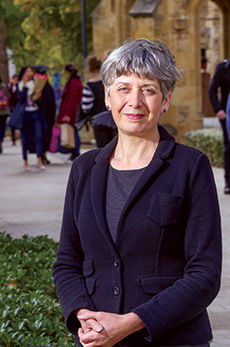Creating new knowledge

Professor Philippa Levy Philippa Levy is not only new to the University, she is in a newly created job working on novel challenges as the University adapts its teaching and learning experience for students in the 21st century.
Professor Levy has joined the University as the inaugural Pro Vice-Chancellor for Student Learning, a role central to implementing the Beacon of Enlightenment strategic plan to transform teaching by making small-group discovery central to the undergraduate experience.
This involves academics working with students to actually research and create new knowledge, rather than just taking lecture notes.
“The Beacon’s vision is one of the main thingsthat attracted me to the University,” she says. “I find it very compelling.”
Understandably so, as Professor Levy has spent much of her life working on ways to adapt teaching to student learning needs, in a range of roles at the University of Sheffield, where she first studied and then rose to a Chair and as Deputy Chief Executive at the UK Higher Education Academy.
“Professor Levy’s work in the UK has captured the essence of a new paradigm in teaching based squarely on student inquiry and research,” Professor Pascale Quester, Deputy Vice-Chancellor and Vice-President (Academic) says.
And so Professor Levy is putting a life of learning and teaching to good work, leading a transformation of not just how the University teaches but also the way student learning extends beyond knowledge to the skills they need for a digital age.
This means big changes for everybody involved. For academics, it includes adapting their content to blended learning, using small-group teaching plus digital delivery of content. Academics will work more closely with librarians and learning designers, for example.
The University’s very successful massive open online courses (MOOCs) demonstrate the resources a blended classroom of digital and in-person teaching can involve, Professor Levy says.
There is much more to it than simply making a digital edition of the same old lectures. For students, it means learning how to make the most of the technology that has always surrounded them.
“There is a debate whether ‘digital native’ is a useful concept,” says Professor Levy. “The net generation may be fluent in various digital resources but they don’t necessarily know how to use them to study more effectively. And a lot of students actually lack confidence using digital resources for study, or just don’t know how to get the most out of them.”
The new teaching and learning culture uses the intensive experience of small-group inquiry for students to learn about individual subjects and also to develop the skills they will need for work and life.
“Students come to university for the love of a subject but they also have expectations of being equipped for employment. The skills involved in academic research, such as critical thinking, gathering and analysing evidence, all translate to the world of work,” Professor Levy says.
Small-group discovery can also help students develop the personal attributes they will need to succeed in working life—an ability to collaborate, and to lead. “And yes, we support students along the way as they develop emotional intelligence,” she adds.
This is truly learning for the love of knowledge butalso for life. “We will equip our students with a portfolio of skills.
“There is a direct connection between the small-group discovery experience and the employability our students,” Professor Levy says.
|



